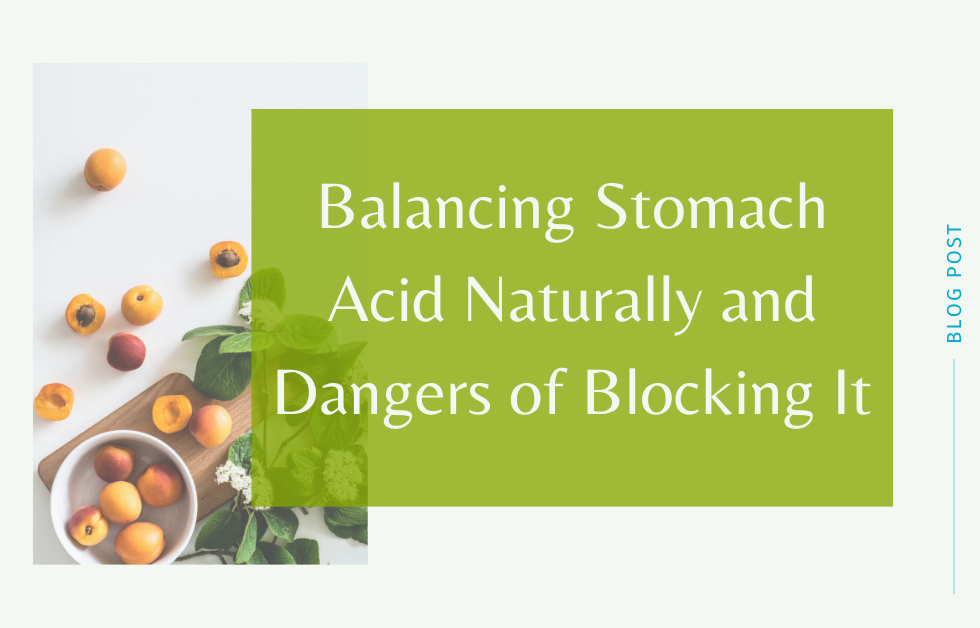Gastroesophageal reflux disease (GERD), also known as acid reflux or heartburn, is a painful condition where stomach acid is backed up into the esophagus. If you experience symptoms of acid reflux, you may experience a burning in the upper part of your chest. Other symptoms may include gas, bloating, or bad breath.
Since the 1980s, medications known as Proton Pump Inhibitors (PPIs) have been recommended by doctors for symptoms of GERD. While PPIs are good at blocking excessive stomach acid and relieving discomfort, the medical community is beginning to pay more attention to the long term effects of PPIs.
Naturopathic medicine looks for ways to balance stomach acid levels naturally and address the cause with natural remedies, stress reduction, and diet changes.
Treating the whole person, and not just the heartburn symptom, gives people lasting relief, and also helps them with other nagging symptoms so they can feel like themselves again.
Hydrochloric Acid’s Function
The stomach’s main function is to produce an acidic digestive juice, hydrochloric acid (HCl). This acid is used to begin protein digestion. Stomach acid is our first defense against food poisoning, H. pylori, parasites, small intestinal bowel overgrowth (SIBO), small intestinal fungal overgrowth (SIFO) or candida overgrowth, and other infections. 1 In addition, it helps us absorb nutrients. Stomach acid also triggers the release of pancreatic enzymes and bile to further support digestion.
Causes of GERD
GERD, also known as heartburn, is caused by stomach acid backing up into your esophagus. But what causes acid reflux to occur?
The sphincter (valve) between the esophagus and the stomach is called the lower esophageal sphincter (LES). The LES allows food to enter the stomach, and it closes to keep food and acid from going up the esophagus, which causes heartburn.
Acid reflux is primarily due to low stomach acid.
A very acidic stomach (pH of 3.0) closes and tightens the LES. Without enough stomach acid the LES will not close all the way allowing food and stomach acid to enter the esophagus causing pain.
To make the acid that the stomach depends on takes an enormous amount of energy- about 1500 calories per day. 2 If someone is dealing with chronic conditions such as adrenal fatigue, insomnia, or allergies, the body’s cellular energy will drop and stomach acid levels will decline. Eating a heavily processed diet and high stress will also lower our levels.
Other causes of low stomach acid may include:
- Eating a processed food diet
- Overeating
- Alcohol or carbonated drinks consumption
- Being overweight
- H. pylori infection- This is a bacteria that may cause ulcers and gastric reflux
- Smoking
- Stress
- Lack of physical activity
- Consuming caffeinated products such as coffee
- Environmental reasons such as pesticides and insecticides
- Genetic predisposition
The most common symptom of GERD is a burning sensation in stomach and chest.
Other symptoms of GERD can include:
- Abdominal fullness
- An acid taste in mouth/bad breath
- Bloating
- Belching
- Candida
- Constipation
- Excess gas
- Hiccups
- Leaky gut
- Moodiness
- Nausea
- Osteoporosis
It is estimated that up to 80 million people suffer from gastrointestinal disease. 3 Proton Pump Inhibitors or PPIs — sold under brand names such as Prevacid, Prilosec, Nexium and Protonix — bring relief by blocking stomach acid completely. H2 acid blockers such as Tagamet, Pepcid, Zantac partially block acid. 4
PPIs are among the most commonly used classes of drugs in the U.S. 5
Dangers of Blocking Stomach Acid
Proton Pump Inhibitors or PPIs — sold under brand names such as Prevacid, Prilosec, Nexium and Protonix — bring relief by blocking stomach acid completely.
Besides blocking absorption of nutrients, acid-blocking medications sometimes come with other side effects. A study published May 30, 2019, by researchers at Washington University School of Medicine in St. Louis and Veterans Affairs St. Louis Health Care System has linked long-term use of such drugs — PPIs — to fatal cases of cardiovascular disease, chronic kidney disease and upper gastrointestinal cancer.6
In January the FDA recalled Zantac due to unacceptable levels of a carcinogenic. 7 Other studies have linked PPIs to bone fractures. The FDA issued a warning for this when using PPIs long term. 8
Ensuring sufficient amounts of stomach acid is more than just relieving discomfort from heartburn or acid reflux.
Without sufficient stomach acid the entire digestive process will malfunction.
This may lead to not only other digestive issues such as gas, bloating, and constipation due to undigested foods but nutrient deficiencies will also occur. These deficiencies can lead to chronic health issues such as osteoporosis, anxiety, skin issues, and allergies. In addition, without enough stomach acid you may end up with unwanted viruses, bacteria and parasites.
In My Practice
“In my opinion, every person that comes in with a chronic health issues has a gut issue until proven otherwise.”
Many patients I see have taken or are currently taking PPIs. Some of them have developed issues from long term PPI use. A large percentage of the time it is due to low stomach acid. I find that when we support digestion, correct any imbalances such as SIBO and SIFO, remove pathogens such as parasites or H. Pylori people begin to feel like themselves again.
In cases of long-term PPI use we mush shore up deficiencies, support the gut, clean up the diet and at times use supplementation to support digestion before we can begin to taper off the PPIs. Stopping PPIs abruptly can cause rebound acid reflux.
Balancing Stomach Acid Naturally
As a naturopathic doctor at Dragonfly 360, to address the underlying cause of GERD, I take a multi-faceted approach.
Step 1: Stress reduction.
Stress Related Mucosal Disease (SRMD) gastritis restricts flood flow to the upper gastrointestinal tract at times of stress.10
Since it takes an enormous amount of energy and blood flow to make stomach acid, chronic stress can reduce this production. An easy way to help with stress and support digestion are breathing exercises. These breathing exercises allow blood flow to return to the GI tract and strengthens the diaphragm which supports digestion.
Step 2: Eat a whole food diet that incorporates lean meats and lightly cooked vegetables and fruits. Avoid toxins such as alcohol and processed foods.
Step 3: Avoid drinking large amounts of water during meals as this dilutes enzymes. Take time to properly chew and decompress mentally while eating.
Step 4: Remove inflammatory foods such as dairy and wheat gluten. Some people feel better removing all grains.
Step 5: Drink water throughout the day. A typical formula is half your body weight in ounces per day. Water helps promote the production of acid in the stomach. Avoid alcohol and limit caffeine intake.
Step 6: Access food triggers. After removing inflammatory foods for 6 weeks such as dairy and wheat gluten it may be easier to assess your food triggers. You can add them back in one at a time and wait 3 days between to see if they are triggering acid reflux.
Keep a journal to keep track of what foods are irritating to you. There may be other foods especially spicy or acidic foods that will be irritating to you at this time. Your triggers can also be lab tested with food allergy or food sensitivity testing.
If you have food sensitivities or allergies a gentle, non-invasive treatment called NAET can help.
Step 7: Digestive Support: If the above changes don’t help then digestive enzymes may be needed. HCl with pepsin is usually taken at the end of a meal and pancreatic enzymes can be taken 5 minutes before meals.
With less stomach acid the pancreas will make less pancreatic enzymes. If you take HCl and your symptoms get worse stop taking it. This indicates that you have inflammation in the stomach that needs to be addressed first. GastroMend-HP contains soothing herbs and zinc carnosine for gastrointestinal inflammation. After 1-2 bottles of Gastro-Mend HP the HCl may be tolerated. (If you have an ulcer do not take HCl.)
Another option is to take a small amount (teaspoon) of apple cider vinegar after meals however if you have SIBO or SIFO this would not be a good option.
Melatonin influences secretion, motility and absorption of the GI tract.
Melatonin is a potent antioxidant which is often used to support sleep and can influence all major functions of the GI tract, including secretion, motility, digestion and intestinal absorption. It has an inhibitory influence on gastric acid secretion that increases the contractile activity of the LES and reduces the symptoms of GERD.9
Curious about what part of your digestive system is most stressed?
Take our Free Gut Health Assessment.
Three part breathing to reduce stress and support digestion
Three part breathing (also known as abdominal breath or yogic breathing).
Inhale from the bottom up. Take deep, full slow breaths, filling the three parts sequentially:
- Feel your belly expand like a balloon with oxygen.
- Rib cage opens in all directions.
- The upper chest, shoulders and throat fill with all the air you need.
Exhale smoothly from the top to the bottom; chest and shoulders drop, rib cage relaxes inward, and finally the belly contracts inward.
Practice for 5-10 minutes a day.
1. Lipski, Elizabeth, Ph.D., CCN, CHN, (2012). Digestive Wellness: Strengthen the Immune System and Prevent Disease Through Healthy Digestion. (pp. 223) (4th Edition). McGraw Hill.
2. Guyton, A.C., J.E. Hall. Textbook of Medical Physiology, 11th Ed., Philadelphia, PA: Elsevier (2006) p. 796.
3. El Serag, H.B., S. Sweet, C.C. Winchester, et al. Update on the epidemiology of gastroesophageal reflux disease: a systematic review. Gut. (2013). [Epub ahead of print]
4. Lipski, Elizabeth, Ph.D., CCN, CHN, (2012). Digestive Wellness: Strengthen the Immune System and Prevent Disease Through Healthy Digestion. (pp. 215) (4th Edition). McGraw Hill.
5. Brown, Troy, RN. “The 10 Most-Prescribed and Top-Selling Medications.” WebMD Health News. www.webmd.com/drug-medication/news/20150508/most-prescribed-top-selling-drugs. Published May 8, 2015.
6. Sauerwein, Kristina. “Heartburn drugs linked to fatal heart and kidney disease, stomach cancer.” https://medicine.wustl.edu/news/popular-heartburn-drugs-linked-to-fatal-heart-disease-chronic-kidney-disease-stomach-cancer/. Published May 30, 2019.
7. Food and Drug Administration. “FDA Updates and Press Announcements on NDMA in Zantac (ranitindine).” https://www.fda.gov/drugs/drug-safety-and-availability/fda-updates-and-press-announcements-ndma-zantac-ranitidine. Published January 8, 2020.
8. Food and Drug Administration. “Possible increased risk of fractures of the hip, wrist, and spine with the use of proton pump inhibitors.” https://www.fda.gov/drugs/postmarket-drug-safety-information-patients-and-providers/fda-drug-safety-communication-possible-increased-risk-fractures-hip-wrist-and-spine-use-proton-pump. Published March 23, 2011.
9. Majka J, Wierdak M, et al. “Melatonin in Prevention of the Sequence from Reflux Esophagitis to Barrett’s Esophagus and Esophageal Adenocarcinoma: Experimental and Clinical Perspectives.” Int J Mol Sci 2018 Jul 12;19(7). pii: E2033. doi: 10.3390/ijms19072033.
10. Proc (Bayl Univ Med Cent.) 2009 Oct; 22(4): 373-376. PMCID: PMC2760176

Dr. Melanie MacLaren
Dr. Melanie MacLaren is a naturopathic doctor and registered yoga teacher who is passionate about natural health and the individualized needs of each of her clients.
Call 317-818-1800 to learn more about Dr. Melanie or request an appointment.

